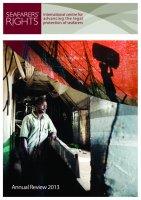
In the meantime, what is the shipping industry doing to continue to promote the issues of fair treatment of seafarers and to condemn instances of criminalisation?
During February 2011 to February 2012, SRI conducted a survey of seafarers covering their experiences of facing criminal charges, and their perceptions of the risks and consequences of facing such charges. The survey was conducted in eight languages (Chinese, English, Japanese, Portuguese, Russian, Spanish, Tagalog and Turkish). And 3,480 valid questionnaires were returned from 18 countries. These countries were Belgium, Brazil, Canada, China, France, Germany, India, Indonesia, Japan, Malaysia, Norway, Philippines, Russia, Spain, Turkey, Ukraine, the United Kingdom and the United States of America.
The findings in the survey strongly suggested that the rights of seafarers, as enshrined in the Guidelines on Fair Treatment of Seafarers in the event of a Maritime Accident, adopted by the IMO and the International Labour Organization (ILO) are often subject to violation.
Seafarers complained of unfair treatment, intimidation and a lack of legal representation and interpretation services. Almost half of the seafarers in the survey said they would be reluctant to co-operate fully and openly with casualty inquiries and accident investigators. Of the seafarers who answered the question in the survey, 85.04% were concerned about criminal charges being brought.
Submissions to the IMO Legal Committee
Seafarers were also asked for their suggestions on how to improve their situation when facing criminal charges.
These suggestions were presented at the landmark 100th session of the Legal Committee of the IMO which met in London on 15 – 19 April 2013.
Seafarers want:
More information on the risks they are exposed to in relation to criminal charges
More information on their rights if they are defendants, complainants or witnesses
Legal and financial support when facing criminal charges
A fair process and fair treatment when facing criminal charges
A greater network of support from governments, the maritime industry, international organisations and lawyers if they do face criminal charges
More uniform laws and procedures given the wide range of different crimes to which they are exposed.
Seafarers said for example:
"We need to be told clearly what our rights are. It is impossible to know everything - even lawyers do not know about the areas and they are specialised;"
"Try to create uniform rules for ships and seafarers or easy to understand rule: ie, info books, leaflets for countries or computer based system to help seafarers understand their rule;"
"The pre-departure orientation seminar should be revisited and improved. Seafarers should be informed and made aware of their rights;"
"Seafarers are not aware about countries laws. They should learn more before they come to the port;"
"Many different rules - each different in each country;"
"When a case is filed against a seaman, he should be allowed to leave the ship to look for legal assistance. However, once he leaves the ship, he won't have money to spend for his case;"
"What is needed is the help of an upright and helpful lawyer to give the seafarer a fair fight in the case filed against him;"
"They should be provided with lawyers who will take their case pro bono because you no longer have a job and on top of that you are fighting a case and surely you won't be able to work again because you will have been blacklisted;"
"There should be somebody from government that should help them because sometimes there's no money anymore;"
“There should be an organisation that provides free legal service to seafarers who are facing criminal charges;"
"Seafarers should have an international legal counsel for assistance in case of criminal charges;"
"Legal aid should be provided to seafarers;"
"Increased involvement of international bodies to provide justice to seafarers;"
"Greater support from unions/company/ government;"
"A single international legal body with specialist knowledge of the sea able to investigate and judge the national legal incidents;"
"The court and judge must include a panel of seafarers and the seafarer must only be punished for an act of intent of total negligence;"
"There must be someone who support and represent the seafafer. As for now the seafafer is a world traveller who is treated by authorities as a second hand citizen which no civilian/businessman/tourist would have experienced without a scandal;"
"The IMO has to intervene, as not all governments (states) take full responsibiity for their seafarers."
Further work
In late 2013, SRI circulated a survey to IMO Member States inquiring about implementation of the Fair Treatment Guidelines and the legal rights contained therein. The results of this survey will be reported to the IMO Legal Committee in April 2014.
“It is clear that due to the unique nature of their work, seafarers are more exposed to criminal proceedings than many other workers and so, there should be special protection in place for them. The current system does not provide such protection” said Deirdre Fitzpatrick, Executive Director, SRI.
“The message from seafarers is loud and clear,” added Ms Fitzpatrick, “Seafarers are saying that their rights are theoretical and illusory; they need them to be practical and effective.”
Source: Seafarers Right
![[ad-side]](http://www.crewing24.com/ad_images/91_banner.png)
![[ad-side]](http://www.crewing24.com/ad_images/107_banner.jpg)
![[ad-side]](http://www.crewing24.com/ad_images/86_banner.png)
![[ad-side]](http://www.crewing24.com/ad_images/65_banner.jpg)
![[ad-side]](http://www.crewing24.com/ad_images/89_banner.png)
![[ad-side]](http://www.crewing24.com/ad_images/87_banner.png)
![[ad-side]](http://www.crewing24.com/ad_images/88_banner.jpg)
![[ad-side]](http://www.crewing24.com/ad_images/110_banner.png)
![[ad-side]](http://www.crewing24.com/ad_images/115_banner.jpg)